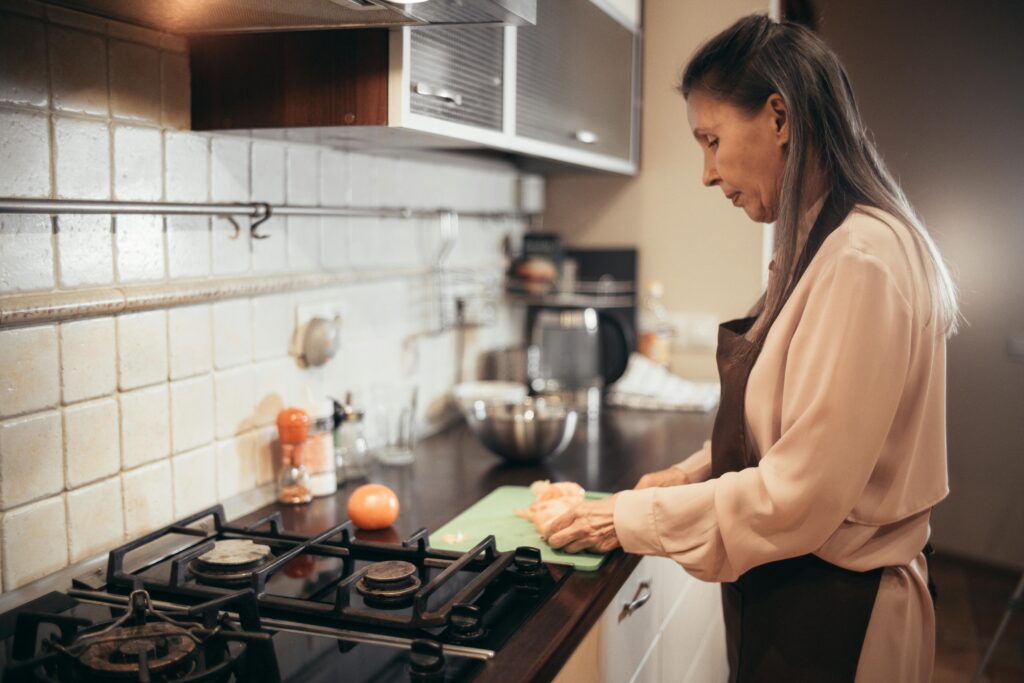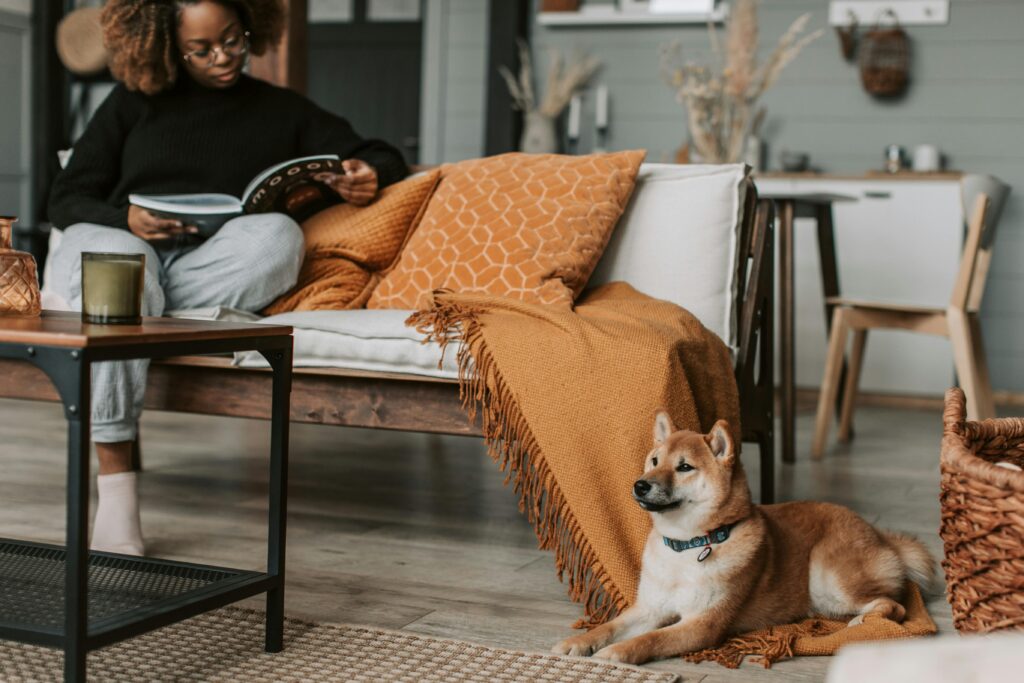Living alone after fifty isn’t what the movies and TV shows like to portray (sad and lonely in a dimly lit room with only cats for company, so many cats — cue the melodramatic soundtrack). It’s actually pretty darn amazing once you figure out the rhythm.
If you’re navigating solo living for the first time, or just looking to upgrade your game, these tips might help you not just survive, but absolutely thrive in your own space.
1. Learn to Love Your Own Company
This one’s big. If you’re not comfortable being alone with yourself, living solo is going to feel like punishment instead of freedom.
Start with small doses if you need to. Turn off the TV during dinner. Take a walk without podcasts or music. Sit with your morning coffee in actual silence. Notice what comes up — boredom, anxiety, restlessness — without immediately trying to fix it.
The goal isn’t to become a meditation guru (unless that’s your thing). It’s to get comfortable with your own thoughts and presence. You may even find you prefer spending time with yourself more than anyone else — that’s a risk you should be thrilled to take.
There are a lot more than 13 reasons to enjoy being single, beyond having your living space to yourslef. Read more in post “The Top 10 Best Things About Being a Single Woman Over 50.”

2. Create Your Perfect Morning Routine
It’s important to recognize and take full advantage of every benefit your single situation bestows upon you. Starting at – well whatever time works best for you!
I discovered that my perfect morning involves exactly 19 minutes of lying in bed quietly once my eyes are open before I’m ready to attempt vertical. Try that with anyone else around.
Want to drink coffee in your pajamas while reading three different news apps? Go for it. Prefer to start with yoga and green smoothies? Show off.
The key is intentionality. Design a routine that energizes you rather than just rushing through the motions. Something you will be grateful for if/when your day gets hectic and also something to look forward to when you crawl into bed at night.
3. Create Rituals That Feel Meaningful
Without other people’s schedules to work around, you get to create rituals that actually nourish you. Sunday morning farmers market visits, Friday night movie marathons, Tuesday evening walks — whatever brings you joy.
I have a “weekend transition” ritual on Sunday nights to help fight off the Monday icks. I plan out one thing to look forward to in the coming week. It could be baking myself a cake or sneaking in a long lunch to see a movie. It sounds cheesy, but it works.
The point is creating markers in your week that feel special and intentional, even when it’s just you.

4. Design Your Space Around You
This might be the first time in years (decades?) that your living space is entirely yours. No compromising on paint colors, no hiding your book collection because someone thinks it’s “too much,” no negotiating over furniture placement.
Make it weird. Make it wonderful. Make it so perfectly you that walking through your front door feels like a hug.
Make the entire place a shrine to your comfort; oversized chair, perfect lighting, side table for tea, a basket of blankets in varying weights for every season, and a a neon banana over your sofa that serves no practical purpose other than making you ridiculously happy.
5. Create Your Own Holiday Traditions
Holidays can feel challenging when you’re on your own, especially if you’re used to family gatherings or couple events. The solution? Create new traditions that feel meaningful to you.
Maybe you volunteer on Thanksgiving morning and have a quiet dinner at home. Maybe you take yourself on a birthday weekend trip. Maybe you host “Friendsgiving” for other solo friends.
The key is being proactive rather than waiting for invitations or feeling sorry for yourself. You get to write the script for your celebrations.

6. Get Comfortable with Eating Out Alone
It’s also a great idea to treat yourself to dinner out once in a while. If the thought of dining solo makes you itch, start small. Coffee shops, casual lunch spots, even the bar at your favorite restaurant. Bring a book, check your phone, people-watch — whatever makes you comfortable.
Here’s the secret: most people are too wrapped up in their own lives to pay attention to whether you’re dining alone. And the ones who do notice? They’re probably thinking “that’d be nice” more often than you’d expect.
I got used to doing this when traveling alone. Some of my best meals have been solo adventures where I could fully appreciate the food, the atmosphere, and my own company without distraction.
7. Master the Art of Cooking for One. Or not.
Cooking for one can feel like a mean joke when recipes are designed to serve four to six people. But, if cooking makes you whole, make the most of it: invest in good storage containers, embrace your freezer, and learn to love “ingredient cooking.” Buy versatile basics like eggs, pasta, and whatever vegetables look good, then mix and match throughout the week.
If cooking bums you out, forget it. There’s no one asking you what’s for dinner every night. Hooray! So keep some of you favorite easy peasy throw together in five, air fryer, one-pan sauce, freezer-to-microwave meals at the ready or just girl dinner yourself a charcuterie board of saltines, string cheese and an apple. Done. Every meal can be made to fit your mood.

8. Embrace Your Weird Habits
Nobody’s watching, so you might as well lean into your quirks. Talk to your plants. Dance in your kitchen. Go commando, we promise not to tell.
I have elaborate conversations with my dogs and have an entire playlist of theme songs for each one. In a cohabitating situation, these might be considered psycho, unusual, or simply losing my marbles. Nope, just signs of being completely comfortable in my own space.
Your home should be the place where you can be your most authentic self, secrets and all.
9. Handle Maintenance Like a Boss
YouTube University is your friend here. You can learn to fix a running toilet, unclog a drain, and change air filters with a few video tutorials and basic tools. Keep a well-stocked toolkit and know where your water shut-off valve is located. Future you will be grateful when something inevitably breaks at the worst possible moment.
For bigger jobs, build relationships with reliable service providers. It’s a great reason to talk to your neighbors. Find a good handyman, a plumber, and an electrician you can call when you need a hand. Do your research about what needs to be fixed beforehand, check reviews, and don’t be afraid to get multiple quotes for bigger jobs.

10. Establish Safety Routines That Don’t Make You Paranoid
Safety matters, but you don’t need to turn your home into Fort Knox. Smart safety is about creating routines that become second nature.
Check your locks before bed. Keep emergency numbers handy. Let someone know when you’re traveling. Install decent outdoor lighting. Basic stuff that gives you peace of mind without making you feel like you’re living in fear.
Have a plan for when things go wrong — medical emergencies, power outages, family crises. Keep basic medical and emergency supplies on hand. Make sure someone has a spare key. Get to know your neighbors well enough to ask for help if needed.
This isn’t about expecting disaster; it’s about being prepared so you can live confidently.
11. Build Your Support Network Strategically
Living alone doesn’t mean being alone — it means being intentional about your connections. The difference is huge.
Create your “inner circle” of people you can call for different needs. Your emergency contact, your “I need to vent” person, your adventure buddy, and yes, someone who’ll check on you if you don’t respond to texts for too long (because let’s be practical here).
Join groups that actually interest you, not just ones where you think you “should” meet people. Book clubs, hiking groups, cooking classes — whatever lights you up. Authentic connections happen when you’re doing things you genuinely enjoy. I recently joined a knitting group knowing nothing about it and just finished my first throw blanket – useful!
For more insights on maintaining social boundaries while living alone, check out “Being Single Does Not Mean Always Available: How to Avoid Becoming a Doormat.”
12. Plan for Emergencies (Without Becoming Paranoid)
Have a plan for when things go wrong — medical emergencies, power outages, family crises. Keep emergency supplies on hand. Make sure someone has a spare key. Know your neighbors well enough to ask for help if needed.
This isn’t about expecting disaster; it’s about being prepared so you can live confidently. Peace of mind is worth the small effort it takes to plan ahead.

13. Celebrate the Freedom
Here’s the thing nobody tells you about living alone in your fifties: it can be absolutely liberating. You get to make every decision based on what you want, not on compromise or negotiation.
This isn’t settling for less — it’s choosing yourself, maybe for the first time in decades.
Living alone in your fifties isn’t about being lonely or giving up on connection. It’s about creating a life so authentically yours that solitude feels like a gift rather than a consolation prize.
Sure, there are challenges, but there’s also incredible freedom in answering only to yourself. This is your time to figure out who you are when nobody else is watching — and to love what you discover.
So go ahead, eat Pop-Tarts for dinner. Dance with your houseplants. Take up space in your own life. You’ve earned it.
What are your favorite things about living alone? Share your tips, tales, or tragedies in the comments.



